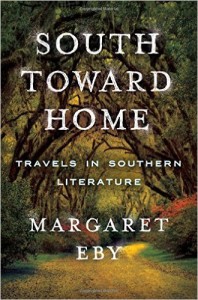By Jim Ewing. Special to The Clarion-Ledger
 If you’re looking for a sequel to the late Willie Morris’ “North Toward Home” in Margaret Eby’s “South Toward Home: Travels in Southern Literature,” you won’t find it. However, Eby’s “Home” is a fascinating travelogue of Southern writers’ home country— including Eudora Welty, Richard Wright, William Faulkner, Flannery O’Connor, Harry Crews, Harper Le and Truman Capote, John Kennedy Toole, and Barry Hannah and Larry Brown.
If you’re looking for a sequel to the late Willie Morris’ “North Toward Home” in Margaret Eby’s “South Toward Home: Travels in Southern Literature,” you won’t find it. However, Eby’s “Home” is a fascinating travelogue of Southern writers’ home country— including Eudora Welty, Richard Wright, William Faulkner, Flannery O’Connor, Harry Crews, Harper Le and Truman Capote, John Kennedy Toole, and Barry Hannah and Larry Brown.
As Eby notes, Faulkner didn’t write about the South; he wrote about Oxford —fictionalized as Yoknapatawpha. In the same vein, Welty wrote about Jackson, and John Toole about New Orleans.
“What makes a Southern writer,” she writes, “is not just the circumstances of his or her birth but a fierce attachment to a particular place.” Eby goes on to give vignettes about the selected Southern writers’ home towns, the places where they lived and wrote about throughout the Deep South. But they aren’t general overviews or a travelogue, per se; rather, they are unique attributes about the towns or the writers who lived in them as reflected by the physical surroundings.
For example, in Jackson, Eby chronicles Miss Eudora’s fondness for fried catfish and butter beans at the Mayflower Café on Capitol Street, and other local haunts. But she zeroes in on the now-open-to-the-public Welty House where, she writes, it’s less like entering another person’s home “than like dropping in to one of her stories.” The objects in the house — and particularly the garden — are masterfully linked to Eby’s obviously voluminous research in a seamless whole, so that Welty comes alive by presenting her provenance.
The formula is repeated in other authors’ surroundings, not the least of which is the absence of an extant home for Wright, who lived across town from Welty. Since his home has been torn down, she traces the trail he sets in his novel “Black Boy” from Natchez—his boyhood home — to Jackson to Beale Street in Memphis, where he also lived.
Eby describes the racism Wright encountered both before and after publication of his seminal “Native Son,” both in his books and contemporaneous accounts, as well as the physical surroundings that exist now. It’s an absorbing juxtaposition of the old and the new that raises profound questions about how race relations have changed and how they have not.
Some of Eby’s juiciest commentary involves Faulkner’s Oxford, where she says, some 50 years after his death, he is “more a part of the social atmosphere … than he ever was in his life.” There, “Faulkner is more than the mythical figure that brought home Mississippi’s first Nobel Prize for Literature. His legend is something like that of a bum uncle who died and revealed a hidden fortune — the very kind of uncle Southerners love to talk about.”
“Home” is a must-read for devotees of Southern writers and especially lovers of Mississippiana, if for no other reason, than the Oxford chapter.
She later returns to Oxford on the piece on Hannah (from Clinton) who described the place as “a United Nations with catfish on its breath,” and Larry Brown (from Yocona), since they were both associated with the place, and Lisa and John Howorth’s Square Books, a literati gathering place like John Evans’ Lemuria Books in Jackson. The tantalizing tales leave the reader yearning for more!
I would have enjoyed a piece about Morris and Yazoo City, especially since she notes that his “North Toward Home” served as an inspiration for her book, for its “warm, evocative” sense of place. Even so, without Yazoo’s inclusion, with her meticulous research and refreshing candor about the South, its places and writers, she does Willie proud.
Jim Ewing, a former writer and editor at The Clarion-Ledger, is the author of seven books including Redefining Manhood: A Guide for Men and Those Who Love Them, now in bookstores.


Comments are closed.